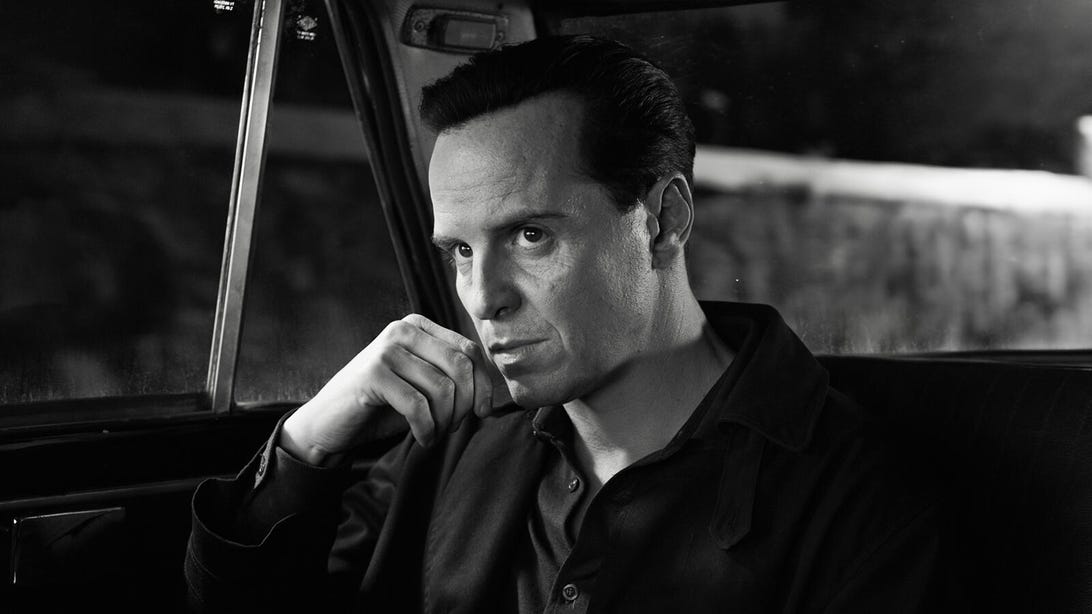Join or Sign In
Sign in to customize your TV listings
By joining TV Guide, you agree to our Terms of Use and acknowledge the data practices in our Privacy Policy.
The Sexless Mr. Ripley
Netflix's adaptation of The Talented Mr. Ripley is all aesthetics, no substance

Andrew Scott, Ripley
Netflix[The following contains spoilers for Netflix's Ripley.]
Tom Ripley climbs a lot of stairs. There are the steep steps that lead up to Dickie's (Johnny Flynn) villa in Atrani, and the soaring staircase that twists toward Tom's (Andrew Scott) apartment in Rome — the elevator always seems to be out; "Italia," the landlady scoffs. Staircases are a defining detail of Ripley, both a metaphorical obstacle (Tom, ever the social climber, is always trying to ascend) and a literal one (how do you remove a dead body from a building? You drag it down the stairs, of course). More than once, writer and director Steven Zaillian's camera tracks the breathless trudge up every stair. Sometimes, from Tom's bird's-eye view on the top floor, he spies on the goings-on in his apartment's lobby. Over the series' eight episodes, it becomes clear that these staircases, striking as they are, function as a representation of the biggest problem with Ripley — a show that is all aesthetics and no substance, and so laborious in getting to the point.
Netflix's Ripley is the latest in the great tradition of screen adaptations of The Talented Mr. Ripley, Patricia Highsmith's 1955 crime novel. First, in 1960, there was Purple Noon, René Clément's French thriller, which starred Alain Delon as Tom Ripley; and in 1999 there was Anthony Minghella's 1999 classic, also called The Talented Mr. Ripley, starring Matt Damon in the titular role. As the story goes, Tom Ripley, a handsome and alluring young con man from New York, is sent to Italy to retrieve a rich man's layabout son, but ends up killing him, assuming his identity, and leaving behind a dark trail of deception. The concept is so compelling — a lower class man ingratiating himself into the upper echelon of society, all under false, murderous pretenses — that it was only a matter of time before the character was brought into the streaming era.

Click through for the latest on spring TV
Andrew Scott, generally one of our most soulful and likable actors, was always an interesting choice to play Tom Ripley. At 47, he's older than the character traditionally is at this stage in the story. (Highsmith would go on to write about Tom's exploits as he aged in later novels.) It's not unintriguing to imagine this story told from the perspective of a man in his 40s — when we meet Tom in Episode 1, he's living in a dilapidated New York City apartment, poorly running a scheme in which he scams patients of chiropractors out of their money, not yet a great con man and almost pathologically charmless. It's a pathetic sight, and you can imagine a version of Ripley that unpacks the long series of events that got him to a point where he's older, desperate for money, and down on his luck. Tom's age, though, is never mentioned; neither is Dickie's, for that matter. (Flynn is 41.) Why would a man in his 40s be sent to bring another man in his 40s home from Italy? You have to wonder why Dickie's father (played by Kenneth Lonergan) can't accept that his incredibly privileged adult son has simply chosen to live out the rest of his days in Italy.
Where Delon leaned into Tom's obsessive tendencies and sex appeal, and Damon played up his schoolboy charisma and relentless search for validation, Scott's Ripley prowls around with cold, detached roboticism. Minghella's film is famous for its homoeroticism, but the Netflix series is entirely sexless — too slick to be exciting, too polished to be interesting. Tom's sexuality is always a point of intrigue to the people around him, but he's never shaken by their probing questions. ("I like girls," he deadpans unconvincingly in one episode, in what probably should be a laugh line.) Tom is never shaken by much. As a result, his obsession with Dickie, or at least Dickie's lifestyle, never feels genuine, and Dickie — as well as Dickie's ever-suspicious girlfriend, Marge (Dakota Fanning) — never really seems like he likes Tom very much at all. An early scene finds Dickie catching Tom wearing his clothes and practicing an impression of his voice when he thinks he's alone. Neither has a strong reaction, and the incident is quickly swept under the rug when Tom twists it into an evaluation of Dickie and Marge's relationship.
The conversation should be treated as an early test of Tom's skills as a manipulator, but the flatness of Scott and Flynn's performances takes away any potential edge. It feels unfathomable to say, considering how excellent both of these actors typically are, but without any tension between them, it's hard to believe that Tom could ever be taken seriously as a threat to Dickie and Marge's life together. Whether Tom wants Dickie all to himself or wants to see these people crumble because he's so envious of their money is never made clear. The conceit of the series falls apart when Tom himself can't even seem to muster up any interest in maintaining the scam.
By the time Tom kills Dickie, a gnarly death that comes via a few strikes to the head from an oar, it feels more like a shrug than a climax. Zaillian favors long, dialogue-free sequences in which we see, in painstaking detail, how Tom covers up his various crimes. But over-explaining how he disposes of the bodies rather than exploring how he feels creates an emotional distance that strips the series of any passion. Someone with such a fluid identity should never really be knowable, but to make him a complete enigma is to lose the joy of the character entirely. Where is Tom Ripley's famous magnetism?
Comparing Ripley to its predecessors is unfair; even in this age of constant reboots and remakes and reimaginings, works should be allowed to stand on their own. But taking Ripley at face value is tough when it offers so very little in terms of story and character to be excited about. For good reason, much has been made about how stunningly constructed Ripley is. Zaillian, the screenwriter of a lengthy list of films including Schindler's List and The Irishman, and director of HBO's underrated The Night Of, is joined by cinematographer Robert Elswit, an Oscar winner for There Will Be Blood. Together, the two create a lush and sprawling world, a vast Italian playground of deception that is dense with artistic references, and they employ a perpetually shifting perspective that makes the viewer feel as if they're being constantly, carefully watched, too. Shot entirely in black and white, the series' film noir style is an immediate highlight, and the tricks Ripley pulls off with light are extraordinary. With an air of emptiness that never really lives up to its breathtaking aesthetics, Ripley ends up feeling like more of a mood board than a complete television show.
Ripley is now streaming on Netflix.
